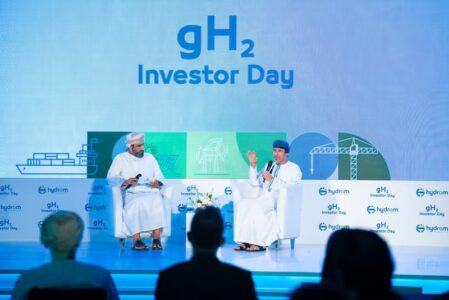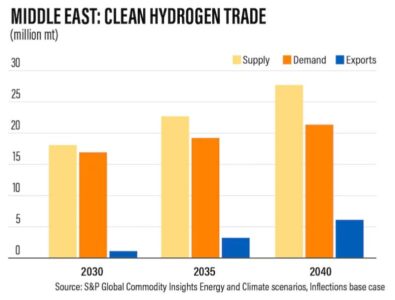Oman remains committed to its multi-billion-dollar green hydrogen programme despite concern about buyers, geopolitical tensions and a potential shift in US clean energy policy, officials said.
Oman’s state-run hydrogen company Hydrom on Wednesday said it would launch a third round of green hydrogen auctions by the end of the first quarter of next year. The country’s Energy Minister Salim Al Aufi also said he is confident about achieving the first final investment decisions (FIDs) by 2027.
“A lot can happen over the course of the next two years, and I’m confident that we will make FIDs in 2027,” Mr Al Aufi said during Hydrom Investor Day in Muscat. “We promise all the developers that we will work with them to make sure that whatever final decision they make, it’s not because of lack of trying and lack of support from the government.”

Oman is positioning itself as a global hub for green hydrogen exports, as many countries in the Middle East turn to the clean fuel as a way to transition to a more sustainable energy future.
The sultanate, which is the second-largest LNG exporter in the Middle East after Qatar, aims to produce up to 1.5 million tonnes of renewable hydrogen a year by 2030, before increasing capacity to 3.75 million tonnes by 2040.
Based on agreements signed during the first two green hydrogen auctions, Oman is expected to achieve a capacity of 1.38 million tonnes by the end of the decade.
In the 2025 auction, Hydrom will aim to provide options for companies seeking to develop smaller-scale projects, in contrast to the “giga-projects” currently under development, Abdulaziz Al Shidhani, Hydrom’s managing director, told The National on the sidelines of the event.
“There are certain scales targeted by certain players in the market, not necessarily to the scale we’ve done in round one and round two,” Mr Al Shidhani said, adding that this approach would improve the chances of securing offtake agreements more quickly.
Lack of demand for the low-carbon fuel is preventing many green hydrogen projects worldwide from reaching the investment stage, with buyers unwilling to commit to long-term purchase agreements.
Oman’s hydrogen projects are designed to secure offtake agreements by 2026 or 2027, Mr Al Shidhani added. However, some developers are already actively participating in international hydrogen auction processes in markets such as Japan, South Korea and H2Global in Germany.
“We’re not worried about securing offtakes. Some of the developers are seriously considering two options: exporting molecules and finding a local consumer [in Oman] who can switch to green hydrogen,” Mr Al Shidhani said.
Mixed signals
The global energy transition may “slow down” as stakeholders pause to assess the impact of continuing geopolitical issues and the appointment of Donald Trump as US president, Mr Al Aufi said.
Companies and investors are concerned that Mr Trump might curtail the flow of government funding for renewable energy projects in the US while driving up the cost of clean energy equipment through a tariff regime.
“None of them is changing the course. If anything, [the energy transition] will be just slowing down a little bit. But, the course has been set and the train has already left the station,” the Omani minister said.
Oman may have to adjust the pace of its green hydrogen programme from “time to time”, but there’s no question of abandoning the current strategy, Mr Al Aufi said.
“I see some of the investors probably hesitating a little bit … it really boils down to, once the first offtaker signs the deal, then the ball is only running at a fast speed from that point on,” he added.
The minister also emphasised the need for direct discussions between sellers and potential buyers to address the key challenge of setting a price for hydrogen.

A more immediate challenge facing the industry is green hydrogen’s much higher production cost compared with fossil fuel energy sources.
Natural gas is expected to become even cheaper in the coming years, with several major liquefied natural gas (LNG) projects set to come online.
This will not halt decarbonisation plans worldwide, Mr Al Shidhani said, adding that “all forms of energy” would be required to meet the growing demand.
BP and Shell, two major players in Oman’s green hydrogen sector, are reducing their global investments in renewable energy. Instead, they are prioritising oil and gas production, which is viewed as offering better short-term returns.
“Business is business ultimately, but I don’t think that it’s a change in strategy by these companies,” Mr Al Shidhani said. They are assessing opportunities and “if it doesn’t work in a country, it doesn’t mean that the same would apply to Oman”, he added.
Shell is the lead partner in Green Energy Oman (GEO), an international consortium aiming to produce 150,000 tonnes of green hydrogen annually using 4 gigawatts of wind and solar energy.
In August, BP announced its acquisition of a 49 per cent stake in the Hyport Duqm green hydrogen project, which is expected to produce about 330,000 tonnes of green ammonia in the first phase and more than 650,000 tonnes in the second phase.
Oman has a “big place” in Shell’s hydrogen strategy, Wiveka Elion, the managing director of GEO, said in a panel session on Wednesday. “In the near term, when we think about transitioning to a low-carbon future, there is a focus on energy hubs, where we will explore carbon capture, but also future fuels, and hydrogen is one of the future fuels,” she said.
IPO plans
Hydrom will not be considering an initial public offering (IPO) in the near future in order to maintain its independence and “orchestrate” the country’s green hydrogen sector, Mr Al Shidhani said.
There have been a string of IPOs in the sultanate recently, particularly from companies within the OQ Group, the state-run energy company.
“Our model is very clear: independently orchestrate the entire sector,” Mr Al Shidhani said. “We don’t anticipate any changes in the model, and we want to maintain that position, at least for the time being, to be independent.”
Hydrom, which is fully owned by Energy Development Oman, was launched in 2022 following a government directive to structure and accelerate the development of the green hydrogen sector in the country.



